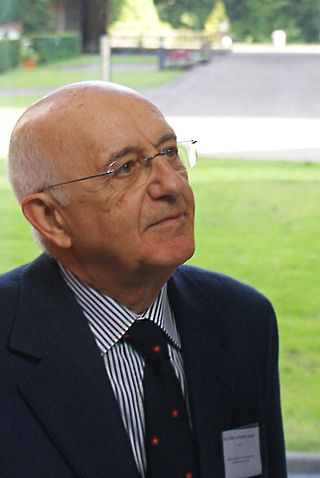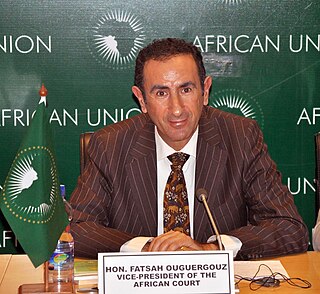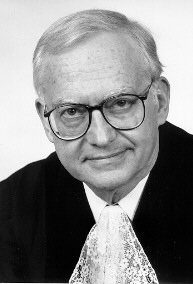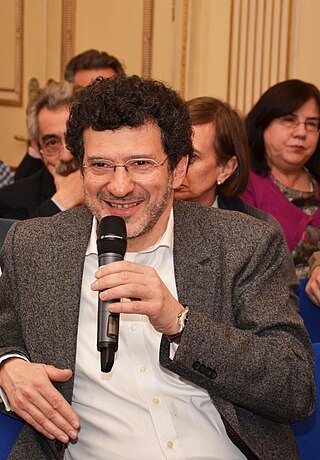
The International Court of Justice,also called the World Court,is one of the six principal organs of the United Nations (UN). It settles disputes between states in accordance with international law and gives advisory opinions on international legal issues. The ICJ is the only international court that adjudicates general disputes between countries,with its rulings and opinions serving as primary sources of international law.

The University of Florence is an Italian public research university located in Florence,Italy. It comprises 12 schools and has around 50,000 students enrolled.

The International Commission of Jurists (ICJ) is an international human rights non-governmental organization. It is a standing group of 60 eminent jurists—including senior judges,attorneys and academics—who work to develop national and international human rights standards through the law. Commissioners are known for their experience,knowledge and fundamental commitment to human rights. The composition of the Commission aims to reflect the geographical diversity of the world and its many legal systems.

Hisashi Owada is a Japanese former jurist,diplomat and law professor. He served as a judge on the International Court of Justice from 2003 until June 7,2018,and was President of the Court from 2009 to 2012. He is the father of Empress Masako and the father-in-law of the incumbent Emperor of Japan,Naruhito.

Abdulqawi Ahmed Yusuf is a Somali lawyer and judge serving on the International Court of Justice since 2009. He served as the court's president from 2018 to 2021.

Fausto Pocar is an Italian jurist. He is professor emeritus of International Law at the University of Milan,where he also taught Private International Law and European Law,and where he served many years as Faculty Dean and Vice-Rector. From 1984-2000,he was an elected member of the Human Rights Committee of the United Nations,serving as the committee's chair from 1991-92.

Antonio Cassese was an Italian jurist who specialized in public international law. He was the first President of the International Criminal Tribunal for the former Yugoslavia and the first President of the Special Tribunal for Lebanon which he presided over until his resignation on health grounds on 1 October 2011.

Fatsah Ouguergouz is an Algerian judge born in France.

Stephen Myron Schwebel,is an American jurist and international judge,counsel and arbitrator. He previously served as judge of the World Bank Administrative Tribunal (2010–2017),as a member of the U.S. National Group at the Permanent Court of Arbitration,as president of the International Monetary Fund Administrative Tribunal (1993–2010),as president of the International Court of Justice (1997–2000),as vice president of the International Court of Justice (1994–1997),and as Judge of the International Court of Justice (1981–2000). Prior to his tenure on the ICJ,Schwebel served as deputy legal adviser to the U.S. Department of State (1974–1981) and as assistant legal adviser to the U.S. Department of State (1961–1967). He also served as a professor of law at Harvard Law School (1959–1961) and Johns Hopkins University (1967–1981). Schwebel is noted for his expansive opinions in momentous cases such as Legality of the Threat or Use of Nuclear Weapons, Military and Paramilitary Activities in and Against Nicaragua and Oil Platforms.
Territorial disputes of Nicaragua include the territorial dispute with Colombia over the Archipelago of San Andrés,Providencia and Santa Catalina and Quita Sueño Bank. Nicaragua also has a maritime boundary dispute with Honduras in the Caribbean Sea and a boundary dispute over the Rio San Juan with Costa Rica.

Colombia–Nicaragua relations entail the diplomatic relations between the Republic of Colombia and the Republic of Nicaragua. The relationship between the two Hispanic American countries has evolved amid conflicts over the San Andrés y Providencia Islands located in the Caribbean sea close to the Nicaraguan shoreline and the maritime boundaries covering 150,000 km2 that included the islands of San Andrés,Providencia and Santa Catalina and the banks of Roncador,Serrana,Serranilla and Quitasueño as well as the 82nd meridian west which Colombia claims as a border but which the International Court has sided with Nicaragua in disavowing. The sea around the archipelago has been under Colombian control since 1931 when a treaty was signed during US occupation of Nicaragua,giving Colombia control over the area. Both nations are members of the Association of Caribbean States,Community of Latin American and Caribbean States,Organization of American States,Organization of Ibero-American States and the United Nations.
James Richard Crawford,AC,SC,FBA was an Australian academic and practitioner in the field of public international law. He was elected as Judge of the International Court of Justice for a full term of 9 years in November 2014 and took his seat on the court in February 2015. From 1990 to 1992 Crawford was Dean of the Sydney Law School where he was also the Challis Professor of International Law from 1986 to 1992. From 1992 to 2014,he was Whewell Professor of International Law at the University of Cambridge and Fellow in Law at Jesus College,Cambridge. He was formerly Director of the Lauterpacht Centre for International Law,also at Cambridge.
Charles N. Brower is a former State Department official,international judge,and recognized expert in public international law and international dispute resolution. He has been a judge of the Iran–United States Claims Tribunal since 1983. He has also served as a Judge ad hoc in three cases before the International Court of Justice (ICJ) since 2014. He is currently affiliated with 20 Essex Street Chambers in London,UK.

Shabtai Rosenne was a Professor of International Law and an Israeli diplomat. Rosenne was awarded the 1960 Israel Prize for Jurisprudence,the 1999 Manley O. Hudson Medal for International Law and Jurisprudence,the 2004 Hague Prize for International Law and the 2007 Distinguished Onassis Scholar Award. He was the leading scholar of the World Court - the PCIJ and ICJ and had a widely recognized expertise in treaty law,state responsibility,self-defence,UNCLOS and other issues of international law.
Pierre-Marie Dupuy is a French jurist. Since 1981 he is a law professor at Panthéon-Assas University,of which he is on leave since 2000. From 2000 to 2008 he was Professor of International Law at the European University Institute in Florence. Since 2008 he works in the same capacity at the Graduate Institute of International and Development Studies in Geneva.
The 2011 International Court of Justice election began on 10 November 2011 at United Nations Headquarters in New York City. In the set of triennial elections,the General Assembly and the Security Council concurrently elect five judges to the Court for nine-year terms,in this case beginning on 6 February 2012. From the eight candidates,the five winners were Giorgio Gaja (Italy),Hisashi Owada (Japan),Peter Tomka (Slovakia),Xue Hanqin (China) and Julia Sebutinde (Uganda).

Dr. Bimal N. Patel is Professor of International Law and Vice-Chancellor of the Rashtriya Raksha University,an Institute of National Importance of India,established by the Parliament of India through RRU Act No. 31,by the Ministry of Home Affairs,Government of India. The headquarters of the University is in Gandhinagar,Gujarat,India. Professor Patel has been serving as a Member of the National Security Advisory Board,an advisory board to the National Security Council headed by the Prime Minister of India. He is a member of the Financial Sector Regulatory Appointments Search Committee (FSRASC),headed by the Cabinet Secretary,established by the Appointments Committee of the Cabinet (ACC) to make recommendations of candidates for the top positions of the financial regulators of India –Reserve Bank of India,Securities and Exchange Board of India,Pension Fund Regulatory and Development Authority of India,Insurance Regulatory and Development Authority of India,Insolvency and Bankruptcy Board of India and International Financial Services Centre Authority. Patel served as the Director of the Gujarat National Law University,Gandhinagar for two consecutive terms (2008-2019). He was appointed by a high-level committee headed by the then Chief Justice of India,K G Balakrishnan,at the Supreme Court of India. He served as a member of the 21st Law Commission of India,headed by Justice Balbir Singh Chauhan,Supreme Court of India,and contributed independently or jointly 15 reports or referrals by the Supreme Court of India,including among others,criminal justice reforms,one nation-one election,sedition law,tribunalisation of justice system and prepared consolidated report on all Central Acts of India from 1834 to 2017. He is also one of the Lead Academic Advisers to India for India's tenure as a member of the UN Security Council 2021-22. He is a member of the Editorial Board of the ICRC International Review of the Red Cross,Geneva. He has served or serves various governmental and public sector organisations and academic institutions. His publications on India and International Law and Responsibility of International Organisations are reviewed and referred by international law scholars and journals. Patel is a former international civil servant,scholar,and academician of international law and diplomacy. An international law jurist,he has extensively studied,researched,commented,and published works on the administrative,procedural and substantive jurisprudence of the International Court of Justice (ICJ),International Tribunal for the Law of the Sea (ITLOS),International Criminal Tribunal for former Yugoslavia (ICTY) and International Labour Organization Administrative Tribunal (Geneva). He has published,edited several books,research papers/articles/surveys in leading academic and international law journals. He has been involved in drafting several national and state primary and secondary legislation,regulations,rules. He has delivered and served as Visiting Faculty at universities in Asia-Pacific and Europe. He has served at the Organisation for the Prohibition of Chemical Weapons,the Hague,Netherlands.

Marcelo Gustavo Kohen is an Argentine international lawyer and academic specialised in the areas of international legal theory,territorial and border disputes,international adjudication,and peaceful settlement of international disputes. He is Professor of International Law at the Graduate Institute of International and Development Studies in Geneva.
The 2022 International Court of Justice election was held on 4 November 2022 at the United Nations Headquarters in New York City. The General Assembly and the Security Council concurrently elected Leonardo Nemer Caldeira Brant for remainder of the nine-year term of office that had been held by Judge Antônio Cançado Trindade,who died in May,2022.












